
Interview with Tony Purnell
Atlas F1 GP Editor
Tony Purnell is the first Jaguar team boss to have kept his job for more than 18 months - and not for nothing. The shy, nerdy-looking Briton is arguably the most humble yet most educated team boss on the grid today, and while Jaguar are not yet running at the upper end of the grid, there's little doubt Purnell managed to turn around the fortunes of the often controversial team. He may not be able to keep Mark Webber, but don't bet against him bringing Ford some satisfaction and more respectability. David Cameron sat down for an interview with the man who says he's a 100% geek - and proud of it. Exclusive for Atlas F1
Formula One works in a kind of binary - you either win or you lose; and the focus on pure racing results means that the immense workload of the losing teams tends to be ignored, no matter how much of an improvement has been made. On pure racing results Jaguar don't seem to have done much to merit acknowledgement, but this is to ignore the astonishing level of excellence in the series overall at present. And there is no doubting the vast improvement in the team from the disarray of just a few short years ago, when the team seemed to have a revolving door of management.
Purnell's greatest achievement at Jaguar has been, arguably, to solidify the structure of the team, to focus minds on the job at hand and move forward from a firm base which previously was one of the flimsiest in the paddock. "I suppose that we're really quite proud of what we've managed to achieve," he says. "We've got a super little team really."
The team's progress coincided with the rise of their star driver, Mark Webber. But even Purnell knows that Webber's progress towards the front of the F1 grid is bound to be faster than Jaguar's. Reportedly, the Australian has a performance clause in his contract that frees him of obligation to the Ford-owned team next season should they not reach a certain performance level – speculated to be sixth place in the Constructors' Championship by the British Grand Prix this season. In that case, he will most likely end up moving to Williams or even Renault in 2005.
"We have a contract with Mark, and if we fulfill the terms of the contract he’ll have to fulfill his side," Purnell confirms. "We think Mark’s a super guy, and he’s completely in line with how we want to run the team, so yes I’d like to keep Webber." And if they lose him? "Then we’ll have the best drivers we can put in the seats," Purnell smiles.
"We've got a lot to do yet, but we're trying to create an organisation where everybody's valuable, and everybody has a role to play, because if you do that you can move mountains. One person can only achieve what one person can achieve, so for me this is a difficult exercise, and what we need to do is create an organisation that, as much as you can, tries to be efficient, because if you're efficient you tend to get more done, actually. I don't think it's different from the aims of any good company in the world."
Changing the Game
Purnell's path to Formula One was anything but obvious. After school he took a job as an apprentice fitter at industrial giant GKN ("I went to work at the steelworks, absolutely hated it and thought, 'right, I'm going to university!'") before commencing his studies, collecting a Kennedy Scholarship which took him to the prestigious Massachusetts Institute of Technology (MIT), gaining degrees in mechanical design, aerodynamics and material science with a thesis on aerodynamics in Formula One. All of which clearly confers him with geek status.
Pi designs and manufactures electronics and software which measure almost everything that can be measured on a car - to such an extent that the term "Pi logger" has become shorthand for the black box data loggers that are found in almost every class of motorsport. Pi Research went on to revolutionise electronics.
"Certainly in motor racing we can be accused of... changing the game," Purnell concedes, hesitatingly. "And I started to remember what I'd been taught at MIT about business, changed it from a little club to a proper, serious business where finance and sales were important, and grew the thing over ten years. I suppose the thing was a success. I did very well out of it personally, and then one day Mr. Ford came along and bought the company. We also did an awful lot outside of motor racing; one in four trucks in North America runs our software…"
Pi continues to be a large profit centre for Ford, as a part of the Premier Performance Division (PPD), which also includes Cosworth Racing and Jaguar Racing. In the winter of 2002 Purnell was appointed Chief Executive Officer of PPD, and among his tasks was the onerous responsibility of improving the underperforming green cars in Formula One.
"When I sold to Ford they said, 'stay on for two years'. I was looking to do something a bit different but I found, much to my surprise, that I liked working for Ford. I found the guy I worked for absolutely inspirational (Richard Parry-Jones), and then he said would I like to lead this? and I said yes.
"My skills are really in strategy and setting things up, getting them going; I'm not a particularly good man manager. People say I'm quite good at seeing how it should be, and then getting the elements in place to get there, which I suppose is what a good CEO does. The people we've got, especially at Jaguar Racing, are excellent, and they're a lot better than I am at any element, which I suppose is how it should be."
Technical Sophistication
The racing side of Purnell's past has never really been elaborated on; most people focus on the business side and think that's all there is to him. "Oh yes; I love motor racing. I've spent an awful lot of my life racing in one way or another, as an enthusiast racing karts, I did a bit of rallying, and you see racing through very different eyes than somebody who's just been involved in Formula One.
"Sometimes I say to people that Formula One has nothing to do with motor racing, and I don't mean that literally but it's just so massively different. But I do feel that so many people involved here would be much stronger if they spent a year in go kart racing, because having to do everything yourself - looking at the weather, the driver psychology, being really organised, remembering it's not really doing what you do well, it's avoiding doing anything badly that counts. All these things really are good experience, and it gives you a feeling for motor racing.
"And then with Formula One you need that technical sophistication, which I got through university, and a business nous, which I got through Pi." The difference from his predecessors is massive, and his approach to racing is working.
So how did he go about fixing the team? Where do you start with a job as large as the one he had been given? "I don't think you need me to tell you about this; you could ask, and I encourage you to ask, the people in the team. I think the difference in style and culture is absolute. We've gone away from a 'just do it' culture to a 'think about it' culture, and we've encouraged people to do things in a restrained and disciplined way. Now that may sound all a bit boring and passionless, but it's also offensive because if you saw how hard people work and how absolutely married they are to what they do, you could never say that this is all without passion.
"All we're trying to do is funnel and organise that passion so that there's little waste, and I think we've achieved that pretty well. We've got a long way to go, make no mistake, but you don't go from organisationally challenged to the slickest, meanest, most organised operation in a year; it doesn't happen. It takes a few years, and then it's just ongoing.
"So we want the ethic to be one of continuous improvement, because it's natural for things to decay, and the leadership - which is not one guy but all the leaders - have to constantly challenge what they're doing and rejuvenate it to keep things efficient. So I don't think it's possible to get to where my perfect company would be, but we can get at least 90% there.
"The easiest (example) is the aerodynamics department, because that was the very first thing that I was involved with. I was an aerodynamicist 20 years ago, and I'd be laughed out of the aero office if I really tried to design anything, but all we did was say: 'look chaps, you're thrashing; you're doing lots and lots of work, but there's not a plan here.' So we set out, and we told the whole department here's how we see a really good aero department, and it had a clearly designed structure, it had technical experts, it had organisational experts, it had a absolute rigour in what they did.
"So we said: we don't think you should try to do so much, you could perhaps do a little less, but try to make it good, so whenever anything comes out of your department the team trusts it, and the manufacturing people know that it's not a wasted part and then you'll build a reputation. And never believe your own results; challenge them the whole time. And we defined a mechanism for doing that.
Advertising with Engineers
Purnell may not be in his ideal job ("I think if you read my masters thesis it's crystal clear that I probably wanted to be Adrian Newey, and something went wrong along the way!"), but for his job he is ideal. Despite the difference in cultures between the two companies he has run - he built Pi from the ground up, whereas he was handed Jaguar as a going concern, albeit slowly – there are quite a few similarities to his approach to the job.
"One of the things I did at Pi was we entered a competition for Business of the Year," he recalls, "and I hired a management consultant at the time, and coincidently he said I had to have a five year plan. I said what a waste of time!
"But we were paying him a lot of money so I thought we'd better do as he says, and we wrote a five year plan which I thought was absolutely barking (mad) at the time, and he said 'just say how you imagine it.' And the next five years went to that plan as though it had been planned, and I just shook my head at it all. I realised that from the moment that I had any involvement here that there wasn't a plan at all, and unless you know where you're going you never get there.
"None of this is me; get any business book, or do any course in Business 101 and they say the same thing; you've got to have a plan. So I didn't do anything particularly special. When I started with the company, we had a plan written out, and some of us re-read that because it's good for your ego! [Managing director] Dave Pitchforth and [director of engineering] Ian Pocock and... Well, I shouldn't single them out, but everybody has reacted to the goals that we set, and its remarkable reading. I wish I could slap it on the internet!"
The other difference in the team, at least from the outside, is that previously Jaguar seemed to be run wholly as a marketing exercise, whereas it now seems to be more focused on achieving technical excellence. "I wouldn't wholeheartedly agree with that," he avers, "the job today is a marketing exercise, but to achieve any real marketing credibility you have to have people kind of admiring you.
"You can achieve lots of short term gains by little soundbites and good publicity exercises, but at the end of the day they don't have much momentum, whereas people saying 'they're getting their act together down there' - that has staying power. And of course some results help; that's what provides real marketing fuel.
"I work for a branch of the advertising industry; it's just that it's a bit odd in that you achieve your poster with engineers, rather than with artists."
The Guys in Detroit
"But I do see some parallels, in that there's a bit of confidence that Ferrari are beatable, and it's kind of encouraging to see them delivering on that. I tell you, I really admire what they've done; good job."
And like everything in Formula One, it ultimately comes down to the money. Jaguar are, relative to the other teams further up the grid, running on a very tight budget, and Ford have been criticised in the media for not pumping more resources into the team to allow them to compete more effectively in comparison to the other major auto manufacturers. But how does Purnell, who ultimately controls the budgets the team runs on, view this seeming disparity? "I'm impressed by the guys in Detroit; they're sharp. It was always about earning respect, because they were, I think rightly, quite disappointed; they'd been promised a lot, but never delivered.
"And they weren't Formula One petrol heads; these are guys running a billion dollar business; and it is very important to me to have Detroit looking over at me and saying 'actually, for the resource they've got they're doing a pretty good job'. And I always said to them, and publicly, that I would only go back (to Ford, for more money) if I felt we had earned the right to the next step. It's very romantic and emotive to say 'give us 500 million dollars and we'll deliver for you', but it's not really very sensible, is it? Anyway, Ford are way too sensible to go with that!
"But it's entirely credible to say: okay, you've given us a very limited (budget) but more than enough, and we've had more than enough money to make a very nice racing car. Now, if you want us to compete for podiums regularly then yeah, it's another step, but let's not just go step change; I'll just say that to make the next step we need this amount, and here's the plan. And hopefully they'll say yeah, okay."
Purnell's budgetary plans are like those of his racing ambitions; one step at a time. He and his deputies have taken the team from structural chaos to streamlined efficiency in eighteen months; Ferrari and BAR have shown that this is the most effective strategy for Formula One today. It can only be a matter of time before the controllers of the purse strings in Detroit open up to help push the green team up to the heights that were promised at that debut four and a half years ago.
It must be nice to work for Premier Performance Division's CEO, Tony Purnell. Despite the clear progress Jaguar Racing have made in the eighteen months that he has held the reins of the team, much of which can be laid at his feet, Purnell constantly demurs whenever he feels he is getting too much praise for the job of turning around the formerly chaotic team. "I do think we've done a good job over the last eighteen months," he admits from the other side of the table in the Jaguar motorhome, his fingers constantly fidgeting with a pen, "but don't forget it's not me that's doing this; it's the guys that are running the show, so the credit is theirs. I've just enabled it."
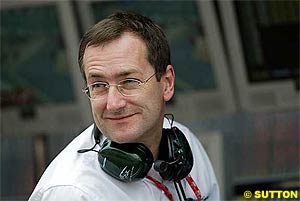 In Formula One terms, Tony Purnell is the antithesis of Mike Gascoyne.
In Formula One terms, Tony Purnell is the antithesis of Mike Gascoyne.
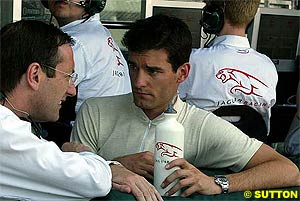 "Yeah, I'm a one hundred percent geek!" Purnell laughs, before going on to confirm it with the rest of his educational details. "I went to Cambridge on a scholarship; I liked Cambridge, and I was doing research into aerodynamic measurements. I stumbled into a consultancy job with Newman Haas, and the chap I worked for at Newman Haas said 'what you're doing is pretty good but you're not appreciated here, why don't you start your own company? I'll leave and start you up.' He was a really good guy who didn't understand anything about how we did things, but he knew that it was good for motor racing." That chap was called Ray Wardell, the year was 1987, and the company formed was Pi Research.
"Yeah, I'm a one hundred percent geek!" Purnell laughs, before going on to confirm it with the rest of his educational details. "I went to Cambridge on a scholarship; I liked Cambridge, and I was doing research into aerodynamic measurements. I stumbled into a consultancy job with Newman Haas, and the chap I worked for at Newman Haas said 'what you're doing is pretty good but you're not appreciated here, why don't you start your own company? I'll leave and start you up.' He was a really good guy who didn't understand anything about how we did things, but he knew that it was good for motor racing." That chap was called Ray Wardell, the year was 1987, and the company formed was Pi Research.
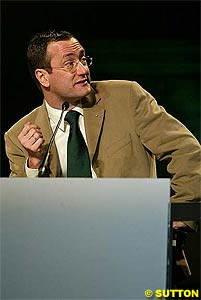 It's easy to say in retrospect, but Purnell was the ideal man for the job after the disastrous Bobby Rahal / Niki Lauda experiments in team management. Purnell has more technical skills than any current team boss (witness the MIT degrees and thesis), as well as a keen interest in karting ("I was keen but hopeless!"), and the combination of technical and business ability along with a life long interest in racing has allowed him to enable the team to move forward from their earlier, darker days.
It's easy to say in retrospect, but Purnell was the ideal man for the job after the disastrous Bobby Rahal / Niki Lauda experiments in team management. Purnell has more technical skills than any current team boss (witness the MIT degrees and thesis), as well as a keen interest in karting ("I was keen but hopeless!"), and the combination of technical and business ability along with a life long interest in racing has allowed him to enable the team to move forward from their earlier, darker days.
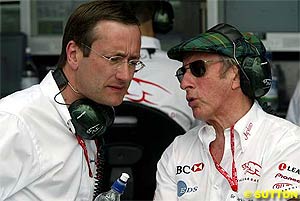 "We said: we'll give you the tools for the job, we'll give you computational fluid dynamics resource, we'll give you a windtunnel, so you can measure it for the job of being the best in Formula One. And if I look two years later at where we are against that vision I smile, and Ben (Agathangelou) who's in charge of the aerodynamics division smiles. You can criticise us because perhaps ever minutiae of that vision hasn't been achieved, but broad brush I'd give the company 9.5 out of 10 - invite Goldman Sachs in, they'll give us 9.5 out of 10!"
"We said: we'll give you the tools for the job, we'll give you computational fluid dynamics resource, we'll give you a windtunnel, so you can measure it for the job of being the best in Formula One. And if I look two years later at where we are against that vision I smile, and Ben (Agathangelou) who's in charge of the aerodynamics division smiles. You can criticise us because perhaps ever minutiae of that vision hasn't been achieved, but broad brush I'd give the company 9.5 out of 10 - invite Goldman Sachs in, they'll give us 9.5 out of 10!"
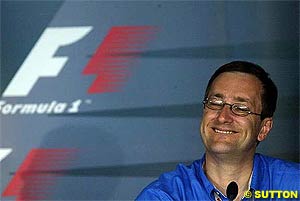 Comparisons are a tricky thing to make in Formula One, but the closest team in terms of history to Jaguar would be BAR, who bought the old Tyrrell team and started racing the year before Ford bought Stewart and renamed it. After years in the wilderness the team from Brackley has come good this year, claiming three podiums and rising. Does Purnell see any comparison between the two? "BAR are spending an awful lot of money and that, along with Honda doing whatever it takes, well, we're not in that position at the moment, so don't expect us to outperform those guys this year.
Comparisons are a tricky thing to make in Formula One, but the closest team in terms of history to Jaguar would be BAR, who bought the old Tyrrell team and started racing the year before Ford bought Stewart and renamed it. After years in the wilderness the team from Brackley has come good this year, claiming three podiums and rising. Does Purnell see any comparison between the two? "BAR are spending an awful lot of money and that, along with Honda doing whatever it takes, well, we're not in that position at the moment, so don't expect us to outperform those guys this year.
|
Contact the Author Contact the Editor |
Please Contact Us for permission to republish this or any other material from Atlas F1.
|
Volume 10, Issue 20
Atlas F1 Exclusive
Interview with Tony Purnell
Articles
Every Other Sunday
The Paint Job - Final Part
2004 Monaco GP Preview
2004 Monaco GP Preview
Monaco GP Facts & Stats
The F1 Trivia Quiz
Columns
Rear View Mirror
Bookworm Critique
On the Road
Elsewhere in Racing
The Weekly Grapevine
> Homepage |